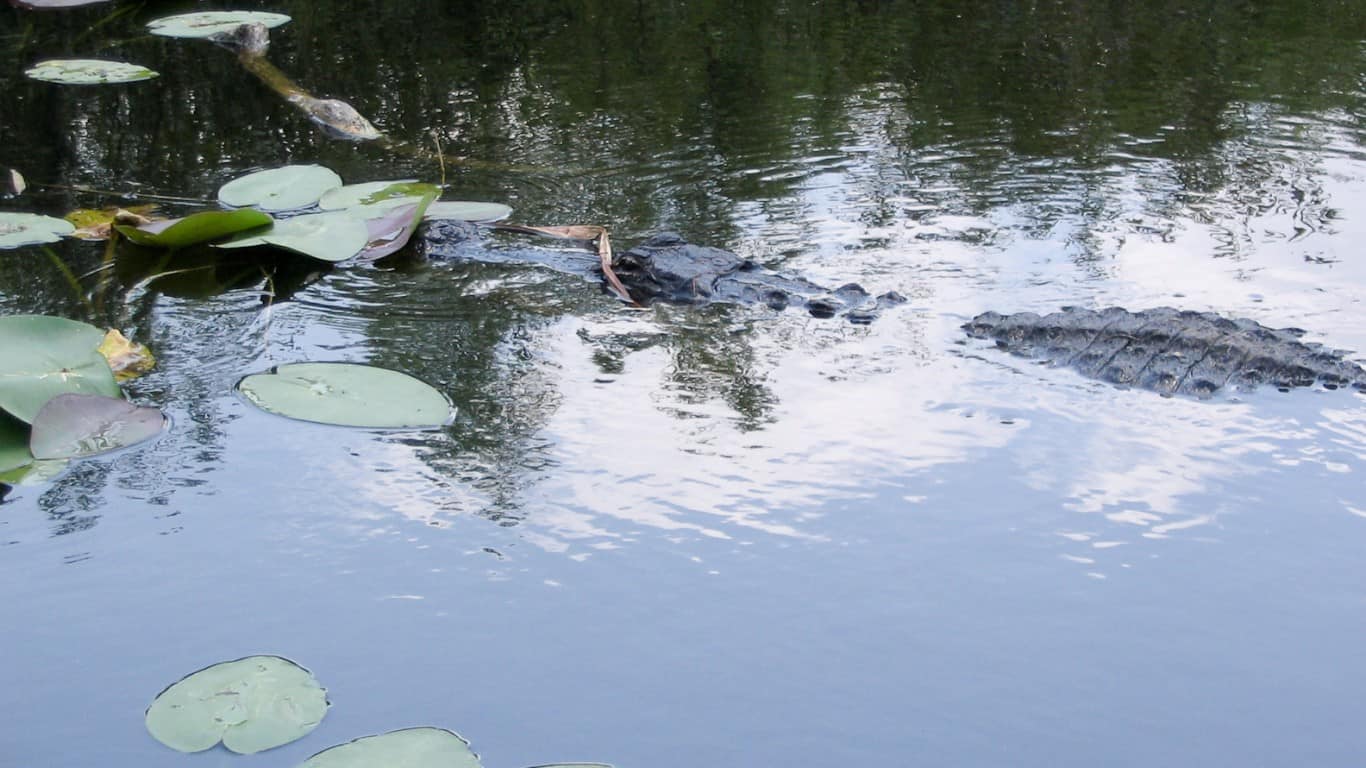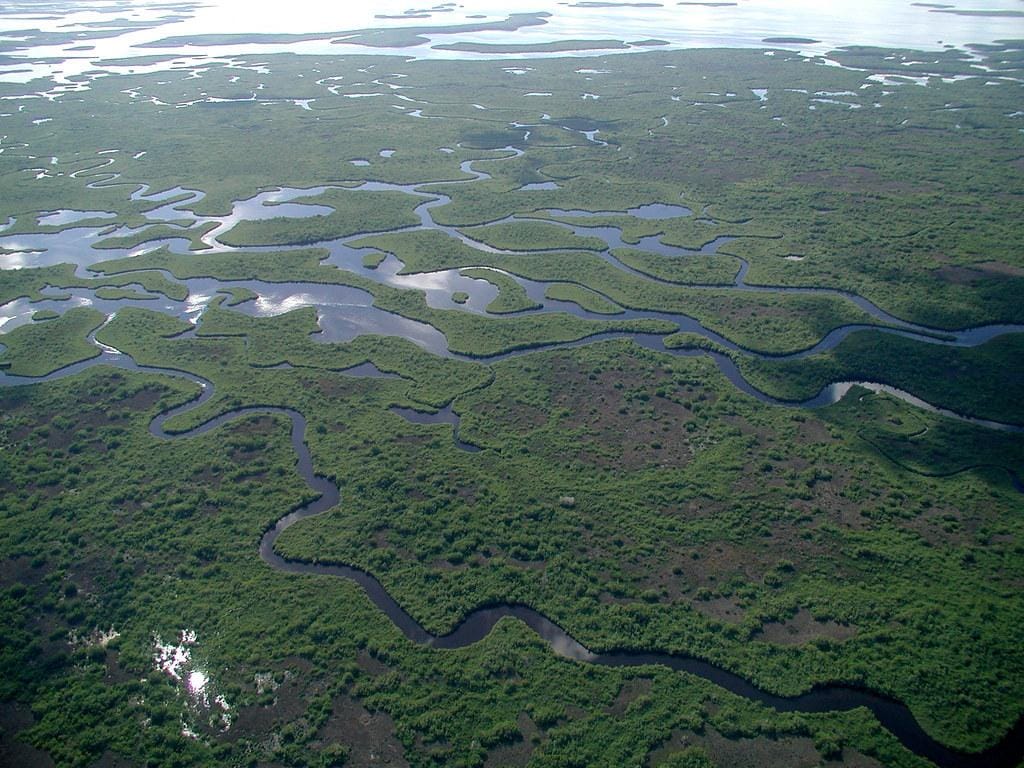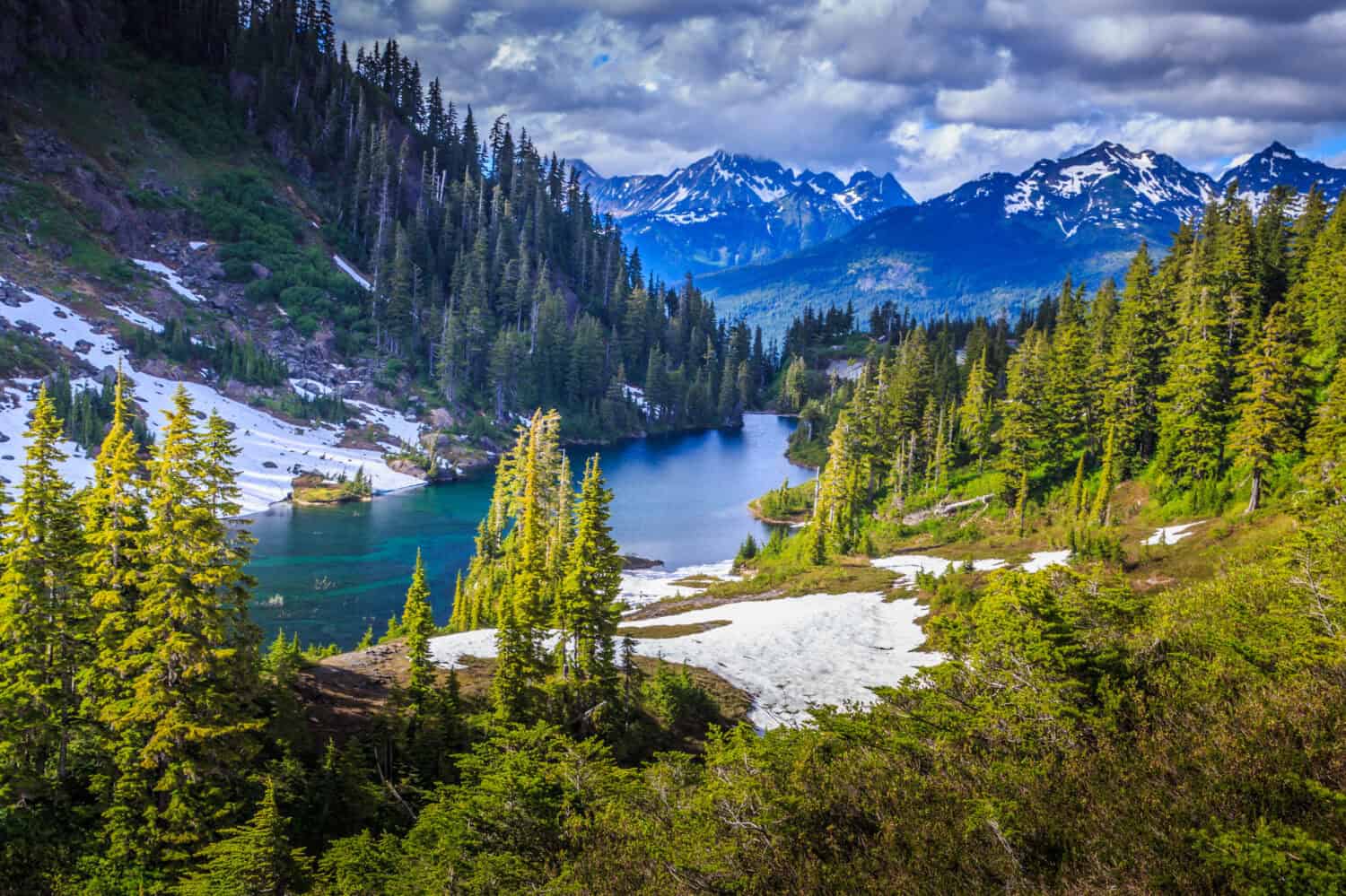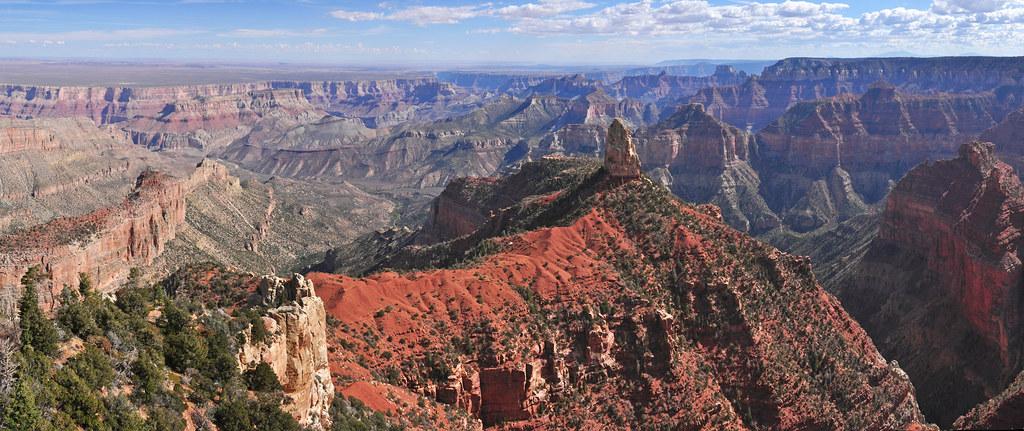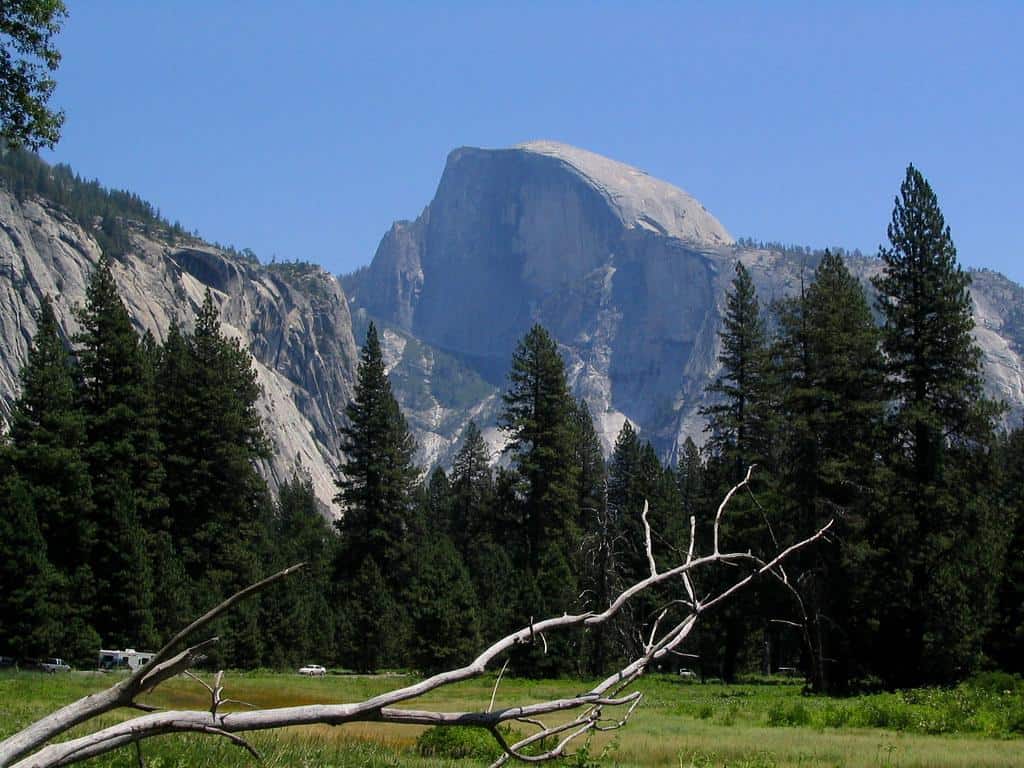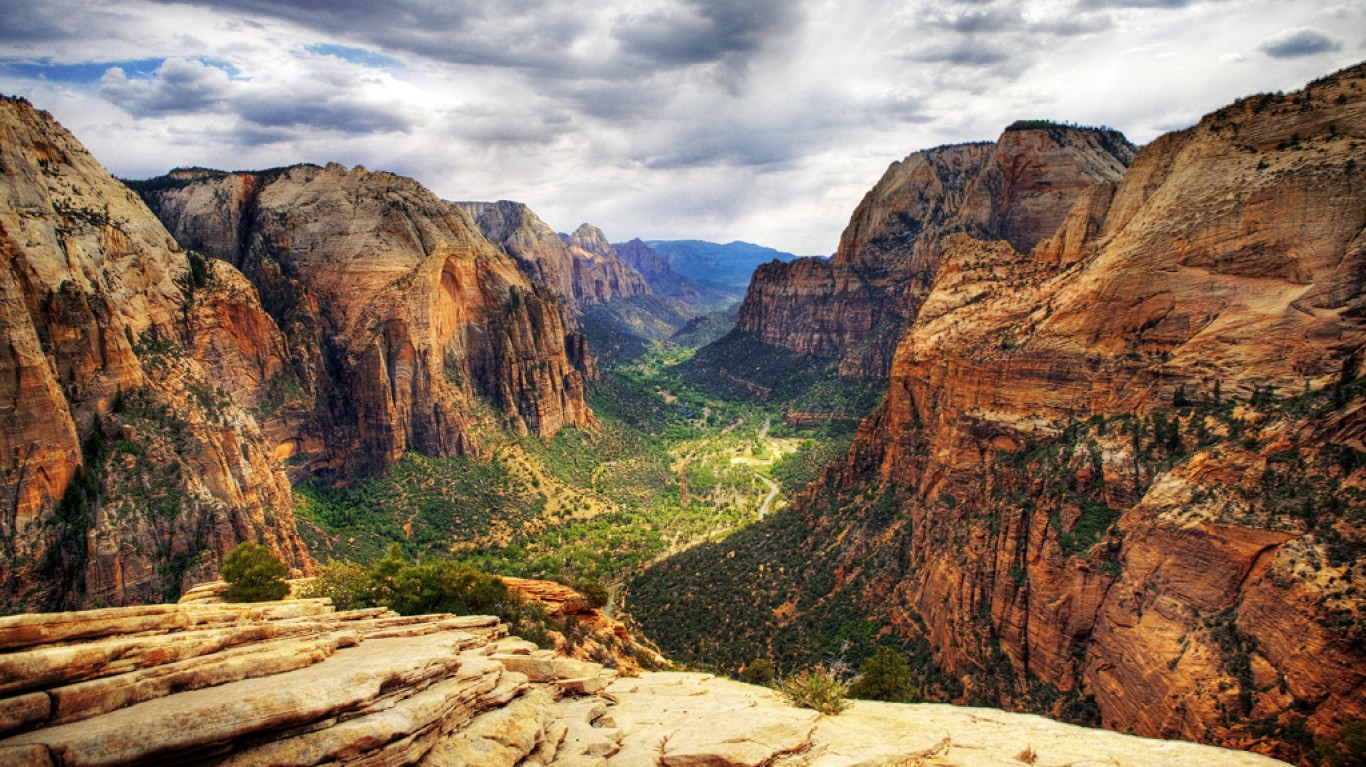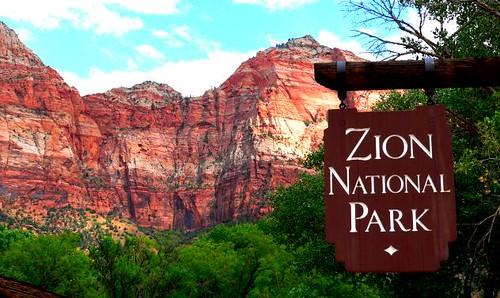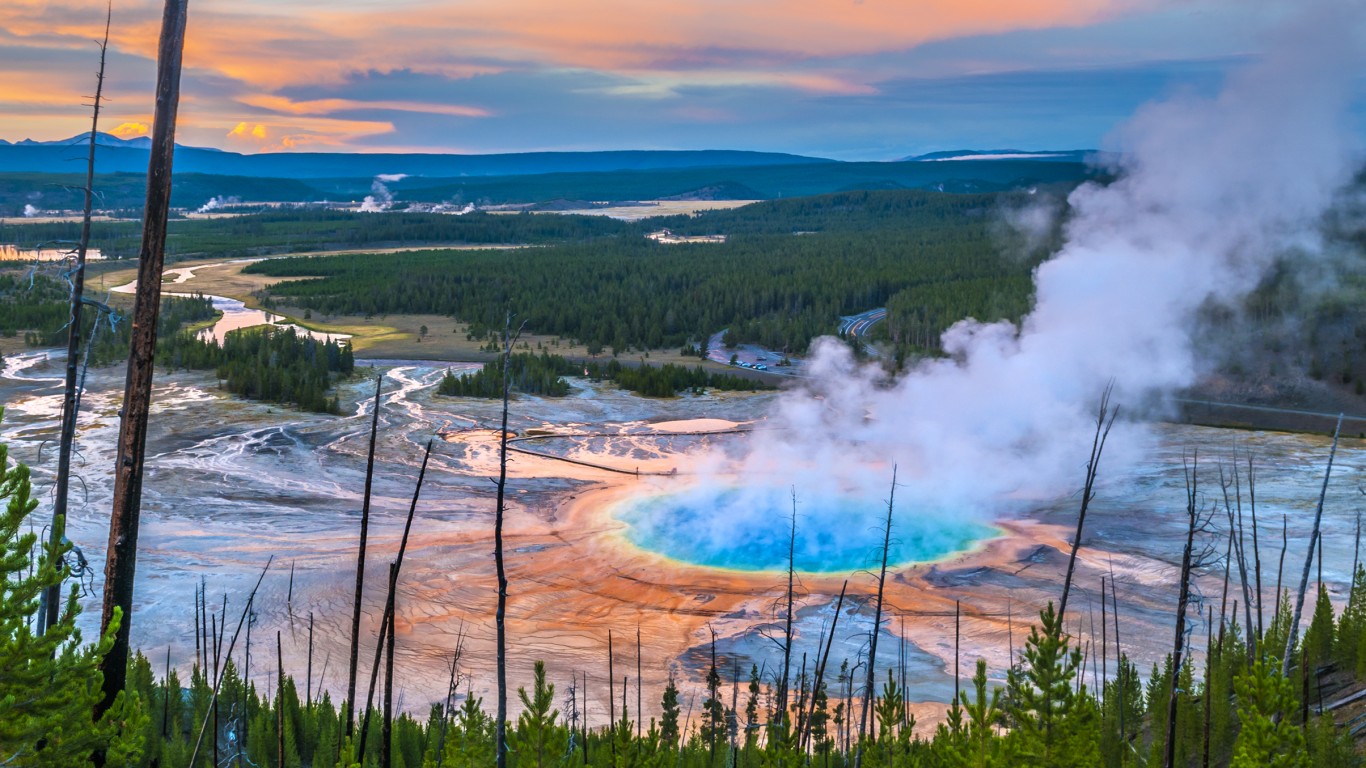
24/7 Wall St. Insight
- Many national parks are free, but some charge entrance fees
- There are 10 parks that charge the most for a standard private vehicle pass
- America the Beautiful Pass is the way to go when planning to visit several parks a year
- Also see: 2 Dividend Legends To Hold Forever
Several national parks have made headlines the past week. Hikers went missing — and were found two days later — in Yosemite National Park; in Glacier National Park, rangers recovered the body of a man who drowned over the July 4th weekend; and two people died in two separate incidents in Grand Canyon National Park. While national parks can indeed be dangerous if visitors don’t adhere to rules and act careless — which is often the case — they also offer great experiences, including remarkable vistas, interesting wildlife, diverse plants, and the ability to access activities that are not part of regular city life. Hiking, camping, fishing, boating, bird and wildlife watching, and many others such activities attract millions of Americans to national parks every year. (Also see: America’s 10 Greenest Cities.)
Also, these experience are relatively cheap. Over 300 national parks are free and do not require any entrance passes. And though an entrance pass is required in over 100 parks, these fees are generally not too expensive, starting at just $5 per private vehicle and its occupants for one day. The most expensive fees are for annual entrance passes, which at the top range cost $70 in 11 parks.
To find the most expensive national parks, 24/7 Wall St. reviewed entrance fees by park, from the National Parks Service. We ranked the parks by the standard pass for a private vehicle, which is often how people and families would arrive at a park. Listed here are the 10 parks that charge $35 for a private vehicle pass. The NPS explains that at some parks, the “Private Vehicle” or “Motorcycle” price includes the vehicle and its passengers. A “Per Person” pass is for those who enter on bicycles or on foot. In parks with only “per person” fees, all passengers would be required to buy a pass. (Visitor statistics also came from the NPS.)
In addition, parks offer an annual pass. All the parks on the list charge $70 for an annual pass. One more park — Rocky Mountain National Park — charges $70 for an annual pass, but it is not on the list because the standard private vehicle pass costs $30. One way to cheapen park entrances, if someone plans to visit multiple parks in a year, is to buy America The Beautiful annual pass, which costs $80 for a private vehicle and allows multiple entries during one year to national parks and federal lands. Another way is to go during free entrance days. Two remain in 2024 — Saturday, Sept. 28 — National Public Lands Day and Monday, Nov. 11 — Veterans Day.
As some of the most iconic and dramatic parks, the 10 national parks on the list drew, combined, over 32 million visitors in 2023. The 10 parks are diverse in their offerings, from geothermal features to geological wonders; from ice-capped peaks to ocean vistas; from giant forests to unique wildlife, and much more.
Why are we covering this
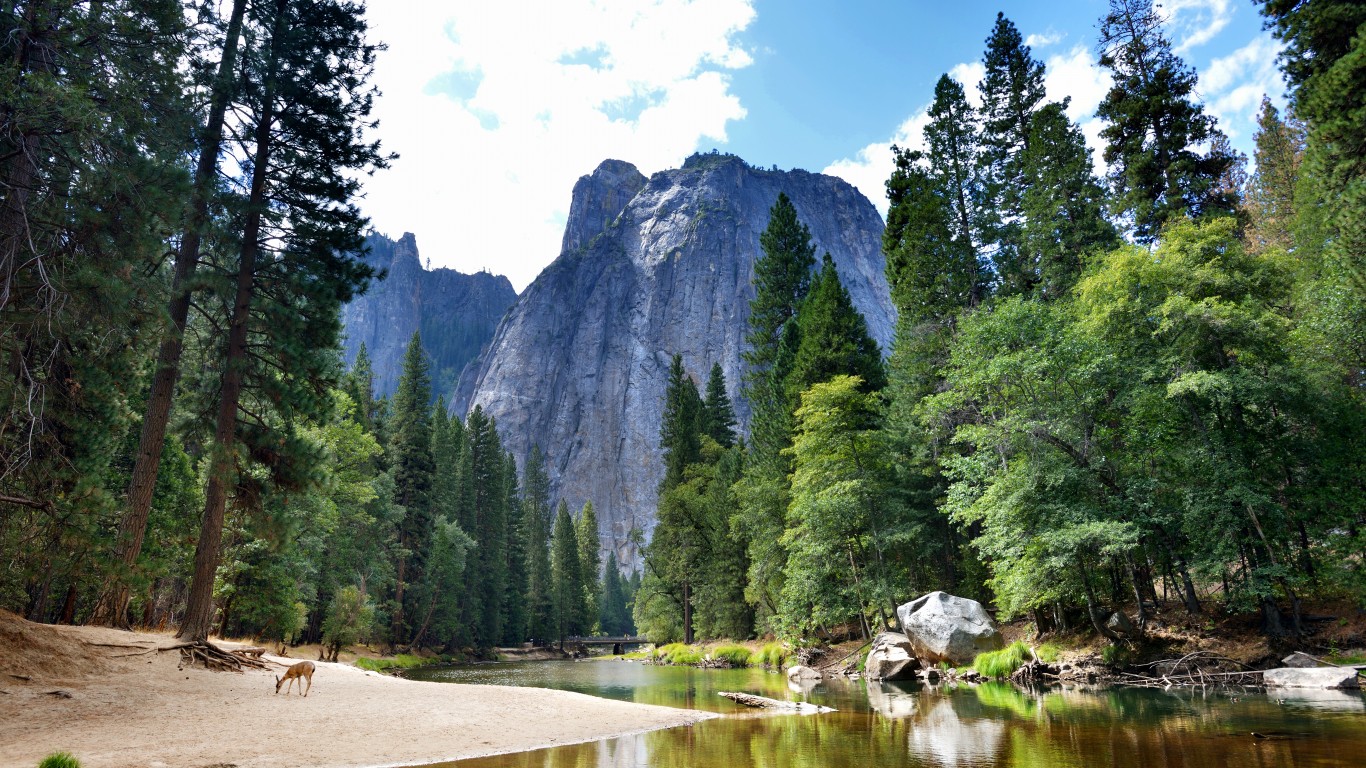
1. Acadia National Park, Maine
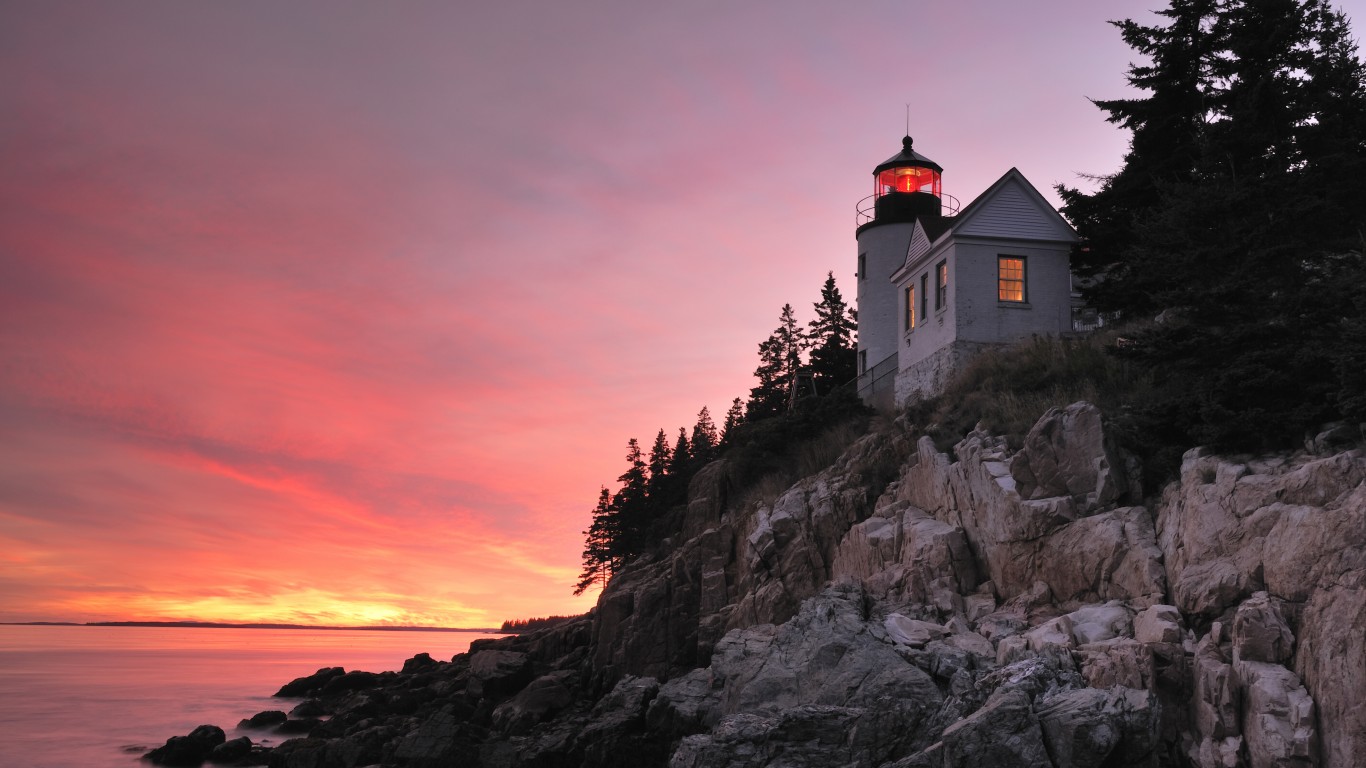
- Private vehicle pass: $35
A park entrance pass is required year-round and must be clearly visible through the windshield. A private vehicle pass (up to 15 people) costs $35 and is valid for 7 days. A motorcycle pass costs $30, and a person pass costs $20.
The park notes that a separate vehicle reservation is also required to drive the Cadillac Summit Road from mid-May into October. These cost $6 and are only sold online in advance and are not available for purchase at the park. An annual pass costs $70. See more info here: https://www.nps.gov/acad/planyourvisit/fees.htm
1. Acadia National Park, Maine
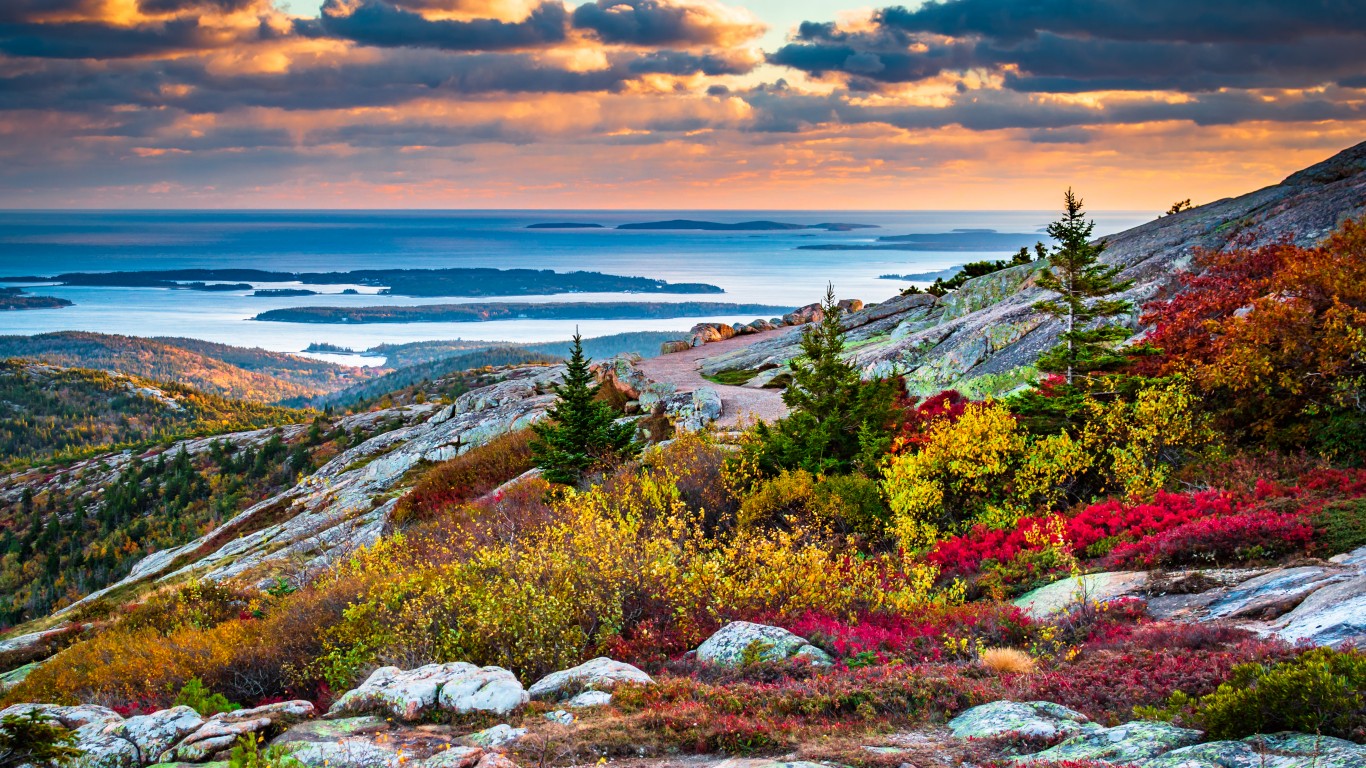
- Visitors, 2023: 3,879,890
Open year-round, Acadia National Park spans 47,000 acres along the mid-section of the Maine coast and is home to some of the more stunning landscapes on the Eastern Seaboard, including mountains, lakes, streams, wetlands, forests, meadows, and coastlines.
The park is also the habitat of diverse wildlife.Bears and moose roam the park’s lands, as well as many other smaller mammals such as mink, fox, deer, and lynx. Peregrine falcons, hummingbirds, and other birds make for fascinating birdwatching. Activities include anything from bus and boat tours to hiking, kayaking, fishing, rock climbing, cross-country skiing, snowmobiling, and much more. See more info here: https://www.nps.gov/acad/
2. Bryce Canyon National Park, Utah
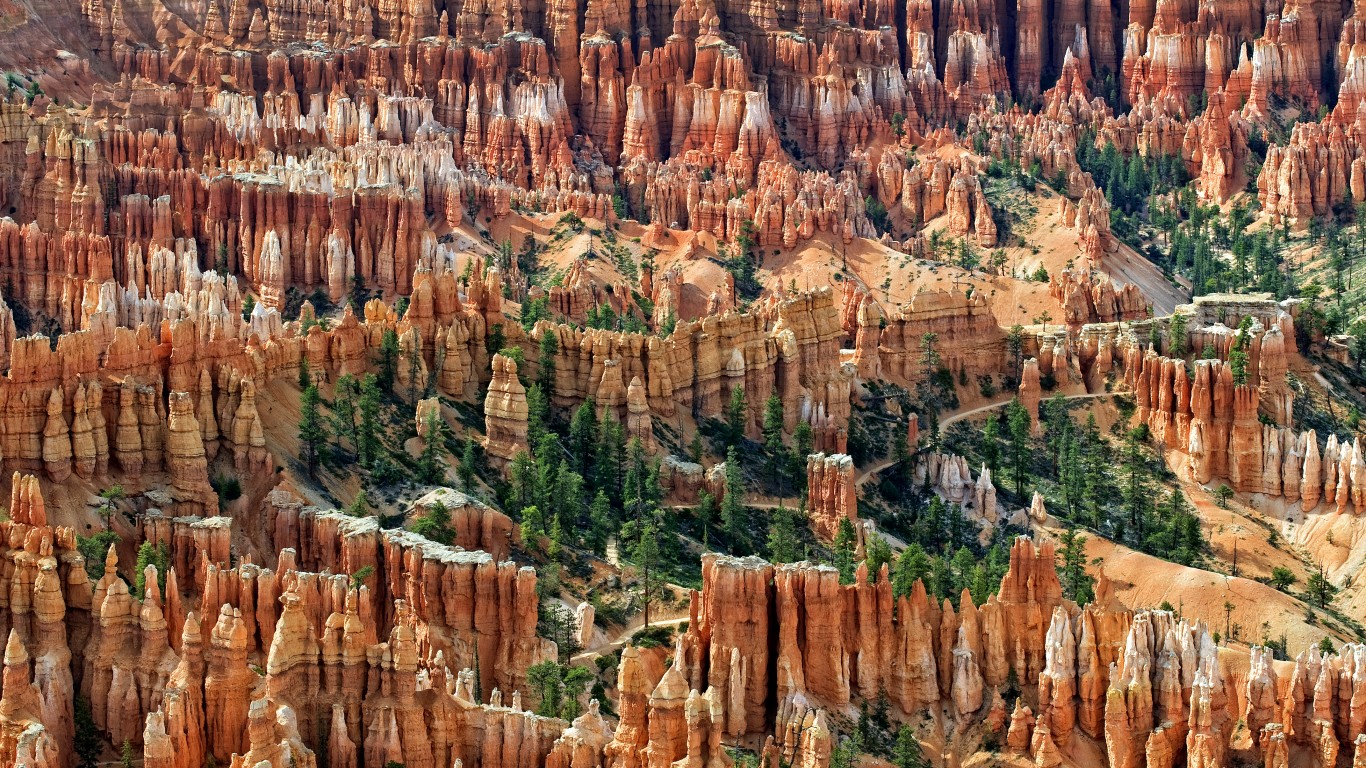
- Private vehicle pass: $35
A park entrance pass is required year-round and costs $35 for a one private, non-commercial vehicle (15 passenger capacity or less) and all occupants. A motorcycle pass is $30, and a person pass is $20, while an annual pass costs $70. See more info here: https://www.nps.gov/brca/planyourvisit/fees.htm
2. Bryce Canyon National Park, Utah
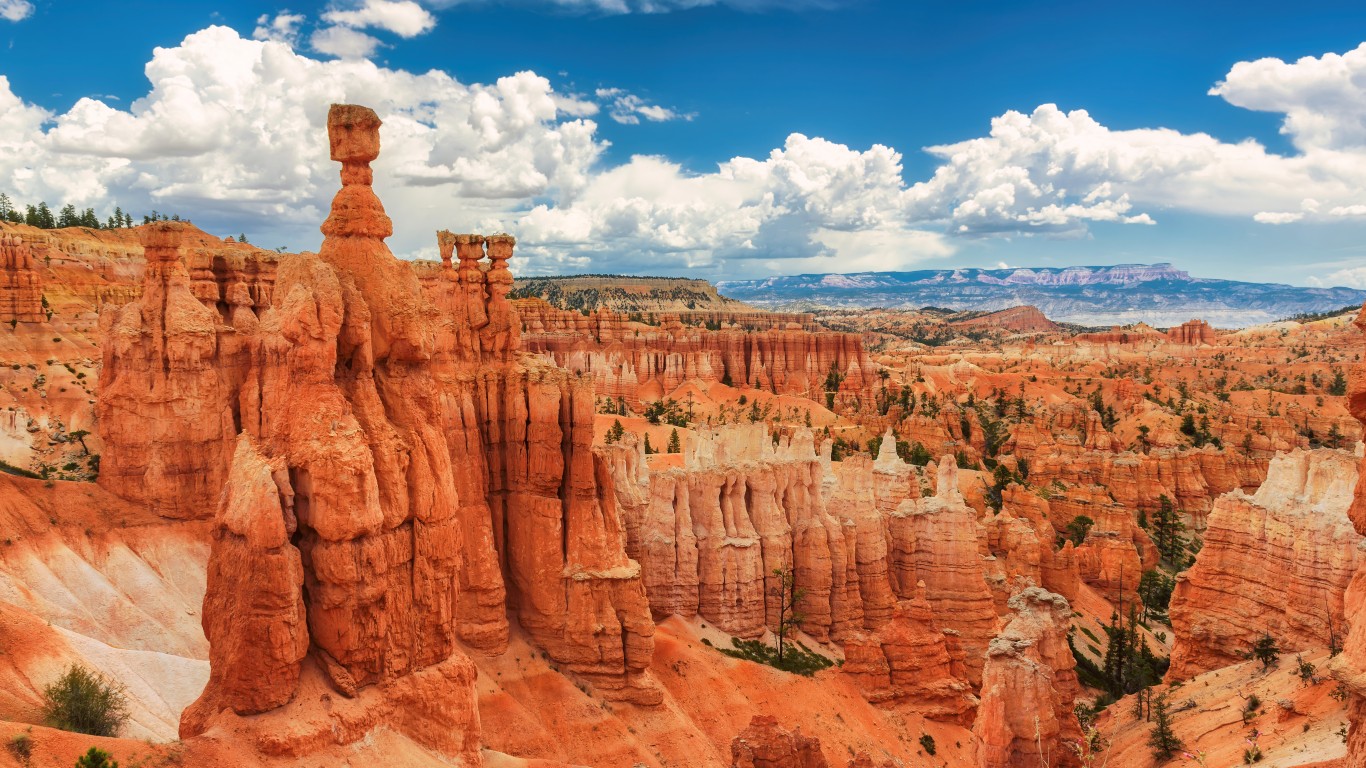
- Visitors, 2023: 2,461,269
Open year-round, Bryce Canyon National Park, located in southwestern Utah, is distinctive for its geological structures called hoodoos — irregular columns of rock formed by frost weathering and stream erosion of the river and lake bed sedimentary rock. While hoodoos exist on every continent, Bryce has the largest concentration found anywhere on Earth.
Relative to the nearby Zion national park (No. 10), Bryce is much smaller and sits at a much higher elevation but provides stunning red, pink, and white vistas. Activities include hiking as well as winter hiking, camping, snowshoeing, cross-country skiing, horseback riding, and more. See more info here: https://www.nps.gov/brca/
3. Everglades National Park, Florida
- Private vehicle pass: $35
A park entrance pass is required year-round. A private vehicle pass costs $35 and is good for seven consecutive days at all park entrances. The entrance fees, however, do not include any tours such as the Shark Valley Tram Tours or any boating tours. A motorcycle pass is $30, and a person pass is $20, while an annual pass costs $70. See more info here: https://www.nps.gov/ever/planyourvisit/fees.htm
3. Everglades National Park, Florida
- Visitors, 2023: 810,189
Open year-round, Everglades National Park protects a fragile ecosystem that provides a habitat for the American crocodile, manatee, and Florida Panther. The park sits on a network of wetlands and forests fed by a river flowing out of Lake Okeechobee, southwest into Florida Bay.
Everglades is the most significant breeding ground for tropical wading birds in North America and contains the largest mangrove ecosystem in the Western Hemisphere. The park is also the habitat of 36 threatened or protected species along with hundreds of birds, fish, mammals, and reptiles. Activities include biking, hiking, boating, fishing, and more. See more info here: https://www.nps.gov/ever/
4. Glacier National Park, Montana
- Private vehicle pass: $35
A park entrance pass is required year-round and must be clearly visible through the windshield. A private vehicle pass costs $35, a motorcycle pass is $30, and a person pass is $20. The winter vehicle rate is $25.00 from Nov. 1 to April 30. In the summer, an additional vehicle reservation is required for three areas of the park for a fee of $2. The pass is good for seven days, but the reservation is only for the allotted time. See more info here: https://www.nps.gov/glac/planyourvisit/fees.htm
4. Glacier National Park, Montana
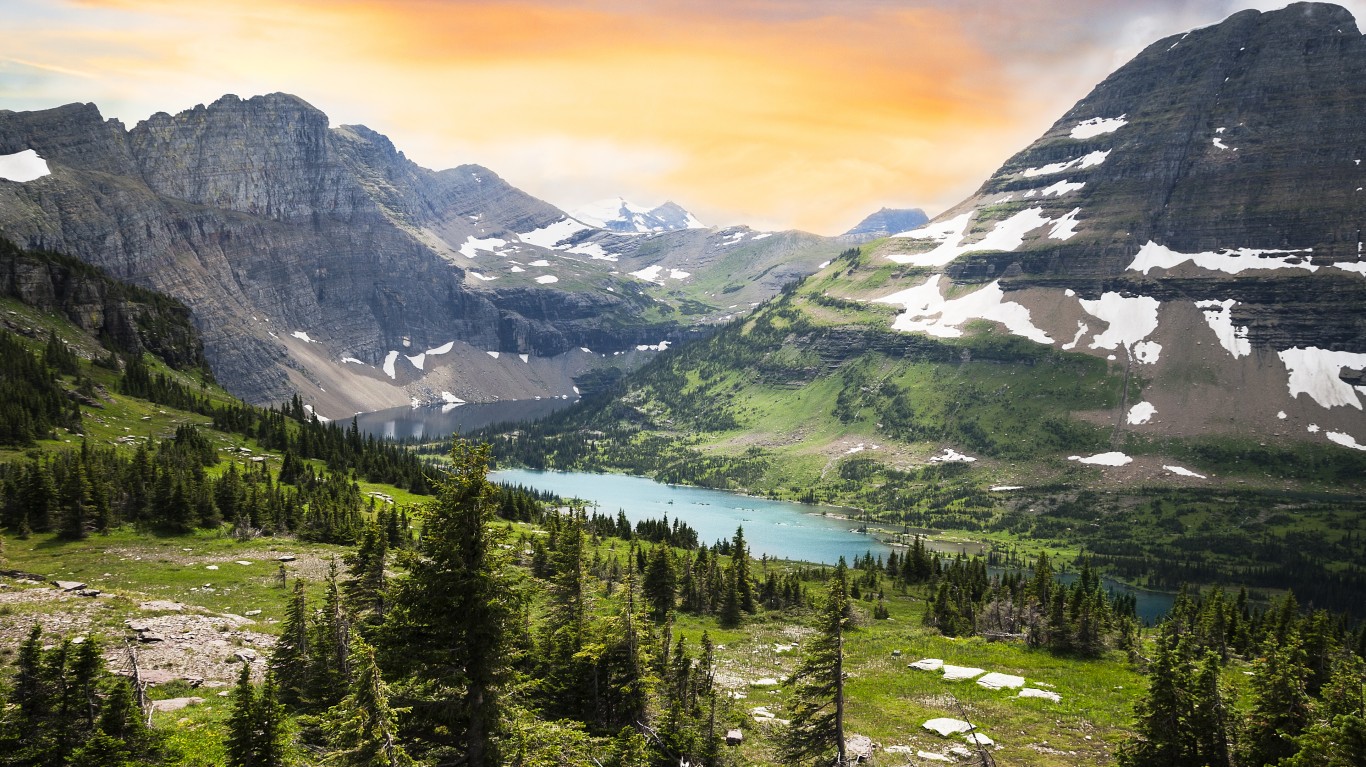
- Visitors, 2023: 2,933,616
Called “Crown of the Continent,” Glacier National Park spans more than 1 million acres in northwestern Montana along the U.S.-Canadian border. The park includes parts of two mountain ranges, over 130 named lakes, several ecosystems, and glaciers, though many glaciers are melting and only about two dozen named glaciers remain as well as 13 rock glaciers.
The park is home to a myriad species of plants and animals, including the black and grizzly bear, bighorn sheep, elk, moose, mountain lion, and mountain goats. Wolf, wolverine, and Canadian lynx also inhabit the park as well as birds such as eagles, ospreys, and owls. Activities include hiking, backcountry camping, biking, fishing, cross-country skiing, boat camping, and more. See more here: https://www.nps.gov/glac/
5. Grand Canyon National Park, Arizona
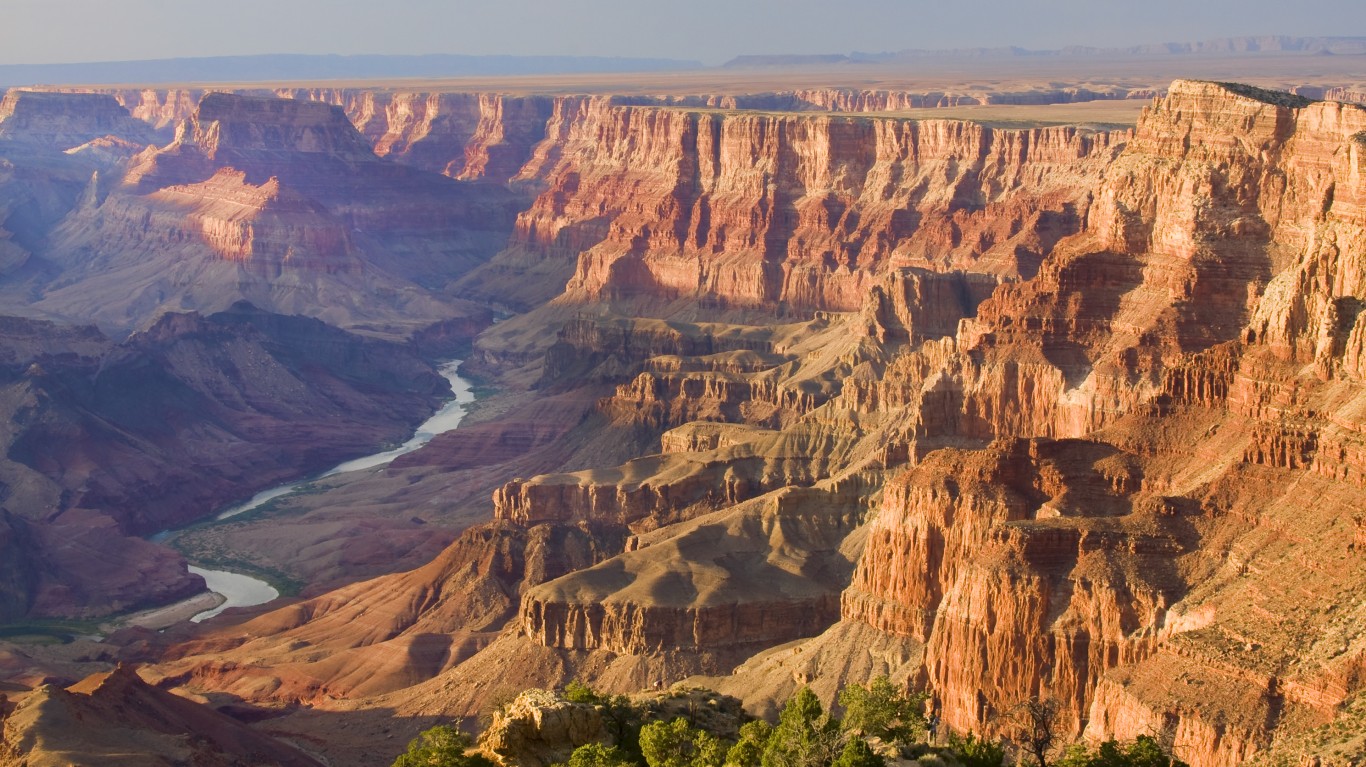
- Private vehicle pass: $35
A park entrance pass is required year-round. A private vehicle pass (up to 15 people) costs $35, a motorcycle pass is $30, and a person pass is $20. The pass is for seven days and includes both the South Rim, and during the season, the North Rim. See more info here: https://www.nps.gov/grca/planyourvisit/fees.htm
5. Grand Canyon National Park, Arizona
- Visitors, 2023: 4,733,705
Within the state of Arizona, Grand Canyon National Park encompasses 278 miles of the Colorado River and adjacent uplands. The mile-deep canyon is one of the most spectacular examples of erosion anywhere in the world, offering unmatched vistas from both north and south rims.
The park is located on the ancestral homelands of 11 present day tribal communities. The North Rim is open May 15 to Oct. 15, 2024. Hiking, backcountry camping, and other activities are available. See more info here: https://www.nps.gov/grca/
6. Grand Teton National Park, Wyoming
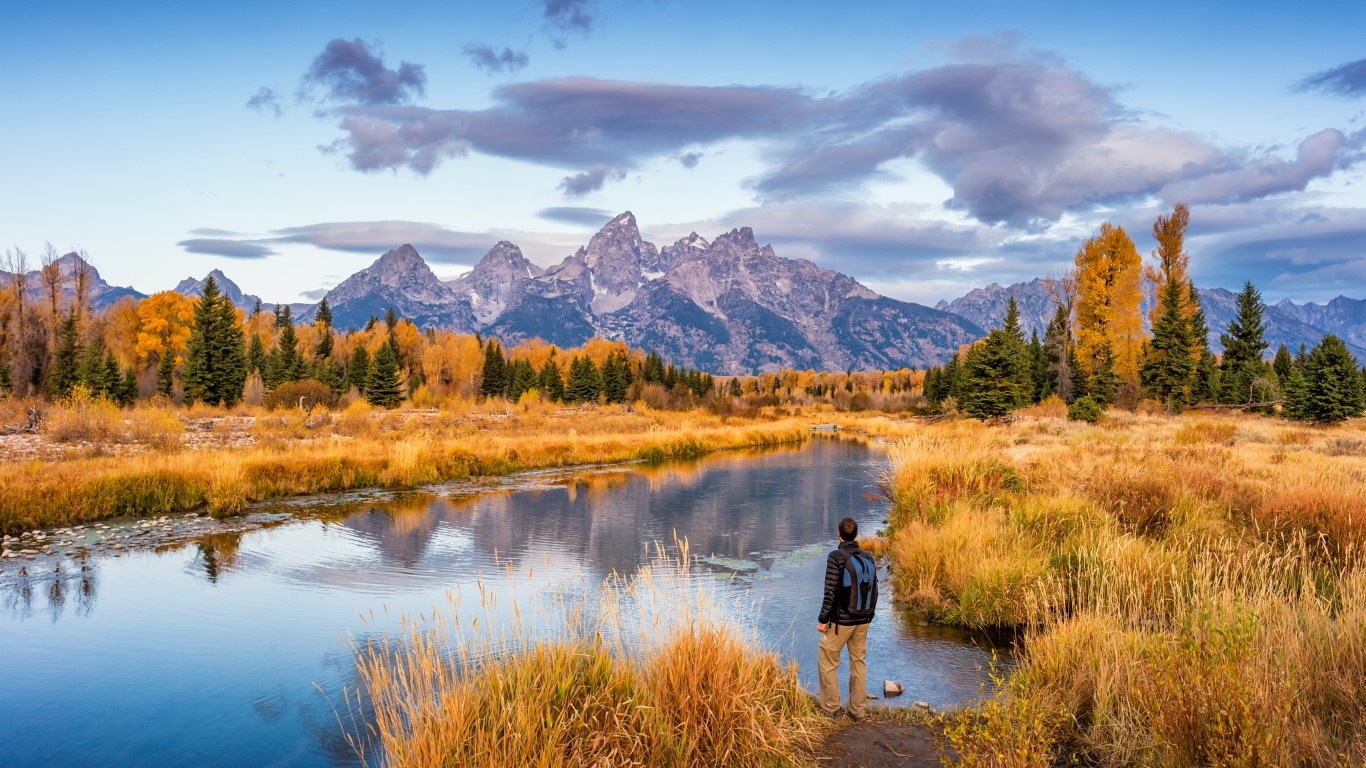
- Private vehicle pass: $35
A private vehicle pass costs $35 and is valid for seven days. A motorcycle pass is $30, and a person pass is $20. An annual pass costs $70. See more info here: https://www.nps.gov/grte/planyourvisit/fees.htm
6. Grand Teton National Park, Wyoming
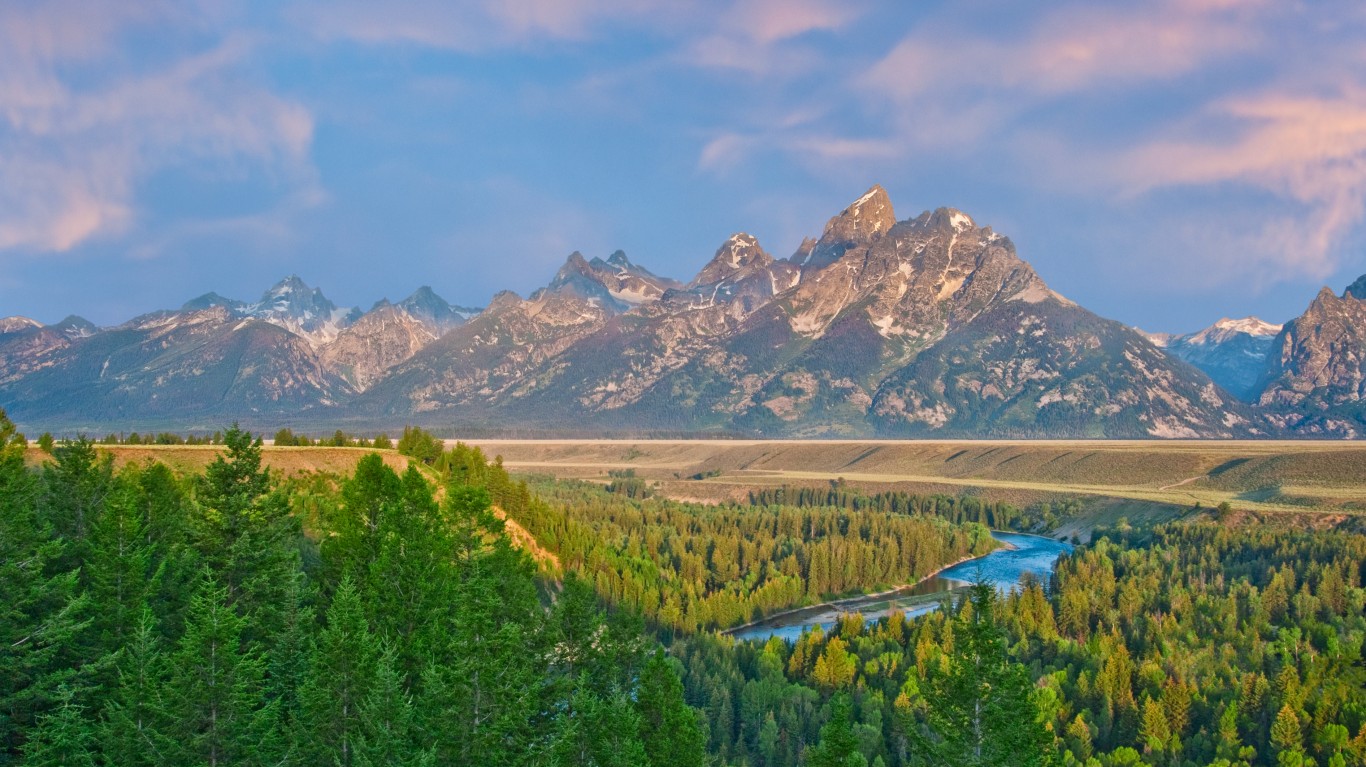
- Visitors, 2023: 3,417,106
Beginning only 10 miles south of Yellowstone National Park (No. 8), Grand Teton is named after the tallest mountain in the Teton Range and spans about 310,000 acres. Rising more than 7,000 feet above the valley of Jackson Hole, the Teton Range dominates the park’s skyline. Activities include hiking, cycling, boating, backcountry camping, and fishing, especially trout fishing.
Grizzly and black bears, bison, moose, elk, pronghorn, and more species live throughout the park so wildlife viewing is yet another fun activity. Although it is open year-round, winters at Teton can be bitterly cold. See more info here: https://www.nps.gov/grte/
7. Sequoia & Kings Canyon National Parks, California
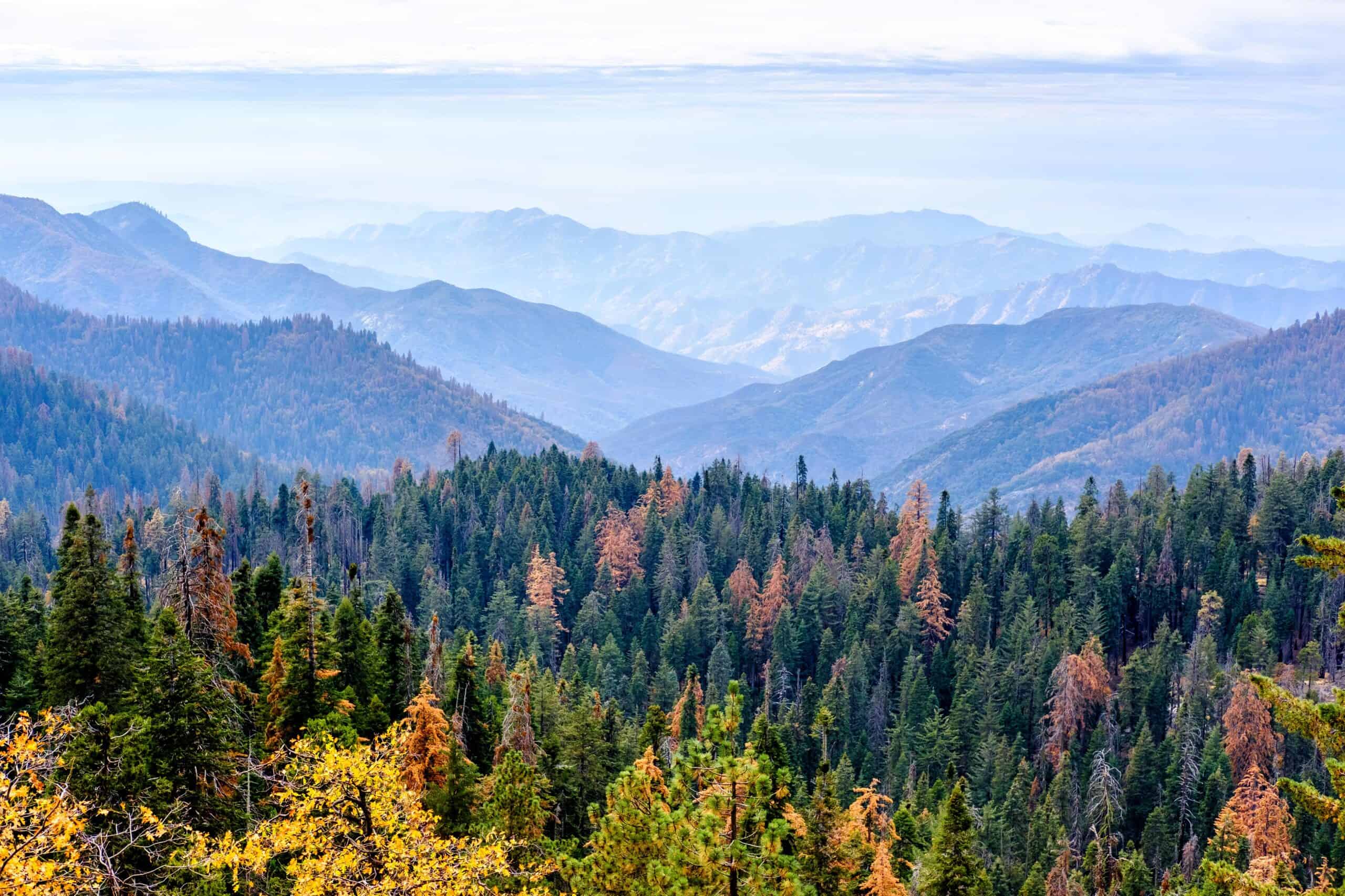
- Private vehicle pass: $35
A $35 private vehicle pass is valid for 1-7 days and includes everyone traveling in a single vehicle for Sequoia & Kings Canyon National Parks and Hume Lake District of Sequoia National Forest/Giant Sequoia National Monument. A motorcycle pass is $30, and person pass is $20, while an annual pass costs $70. See more info here: https://www.nps.gov/seki/planyourvisit/fees.htm
7. Sequoia & Kings Canyon National Parks, California
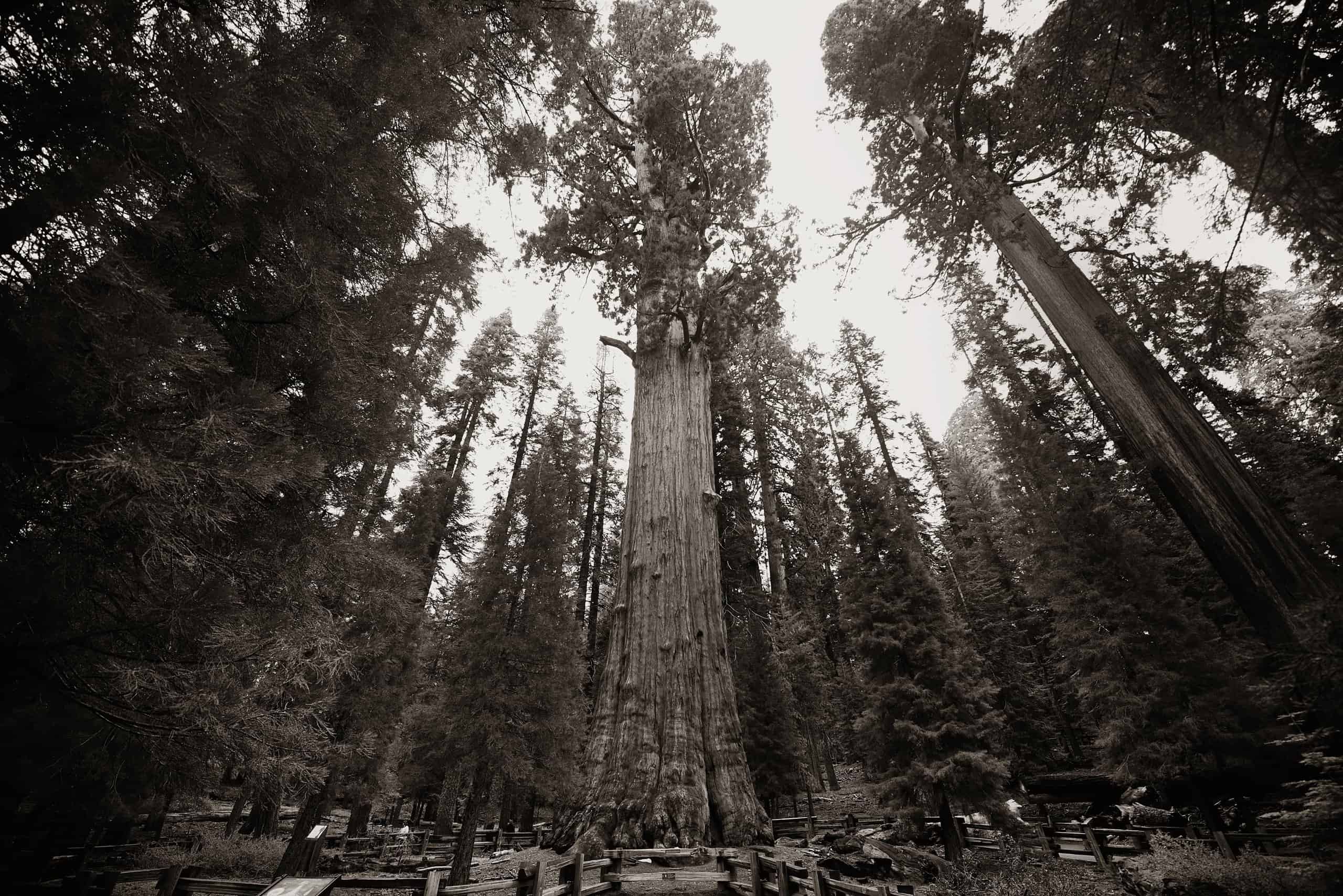
- Visitors, 2023: 980,567
The Sequoia and Kings Canyon National Parks have been jointly administered since 1943. Spanning 1,353 square miles, the parks are a designated UNESCO Biosphere Reserve. The park’s elevation gradient of over 13,000 feet from the Sierra Nevada foothills to the high peaks provides dramatic shifts from hot foothills to cool forests to the cold High Sierra and varied habitats for plants, animals, and other organisms.
As the name suggests, a forest of giant sequoias, the largest in the world, is breathtaking. The Parks feature a wide variety of animals that include over 200 species of birds, mammals, fish, amphibians, reptiles, and many more. Activities include camping, hiking, fishing, wildlife viewing, and more. See more info here: https://www.nps.gov/seki/
8. Yellowstone National Park, Idaho, Montana, Wyoming
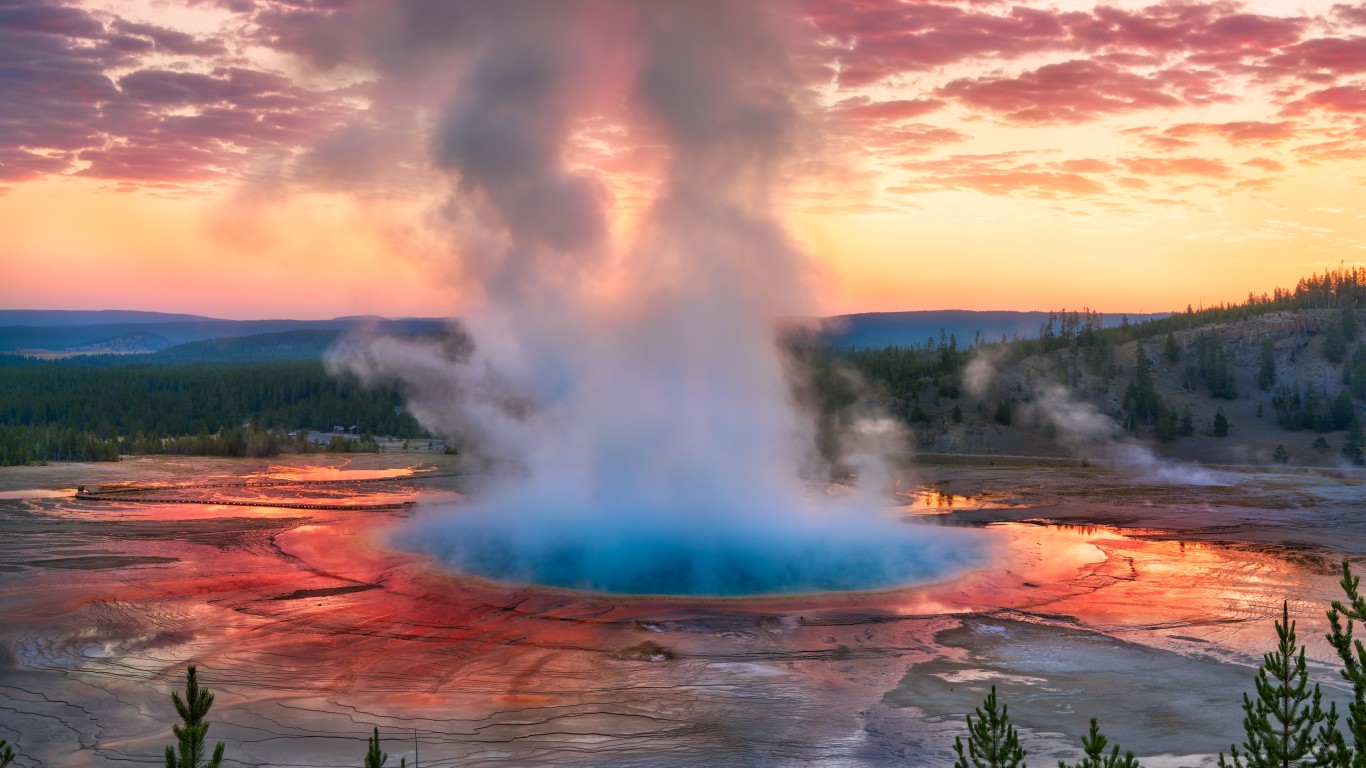
- Private vehicle pass: $35
A private vehicle pass that costs $35 provides unlimited entry for one vehicle and all passengers for seven consecutive days, beginning on the day of purchase. Vehicles must be private, non-commercial, and with a seating capacity of 15 or less. A motorcycle pass is $30, and a person pass is $20. An annual pass costs $70. See more info here: https://www.nps.gov/yell/planyourvisit/fees.htm
8. Yellowstone National Park, Idaho, Montana, Wyoming
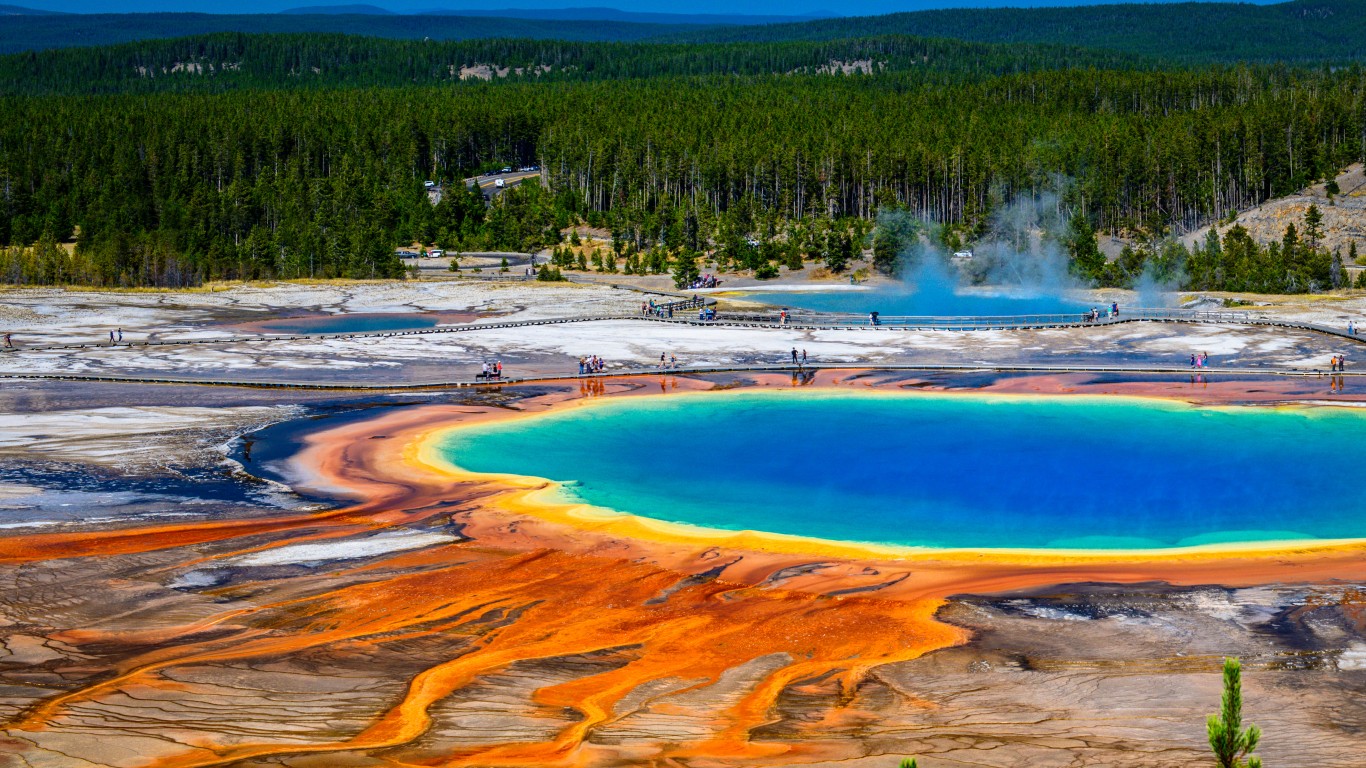
- Visitors, 2023: 4,501,382
Yellowstone National Park is located largely in Wyoming but also extends into Montana and Idaho, spanning over 3,400 square miles. The first national park in the U.S., and some argue in the world, is known for its many geothermal features, the result of it occupying a volcanic complex. Well over half of the world’s geysers and hydrothermal features are in Yellowstone, fueled by this ongoing volcanism.
Apart from the fascinating geothermal features that attract visitors, the park’s lakes, canyons, rivers, and mountain ranges make for breathtaking vistas and provide a habitat for wildlife including hundreds of species of mammals, birds, fish, reptiles, and amphibians. Grizzly bears, cougars, wolves, and free-ranging herds of bison and elk live in this park. Activities include hiking, camping, boating, fishing, and sightseeing. See more info here: https://www.nps.gov/yell/
9. Yosemite National Park, California
- Private vehicle pass: $35
The private vehicle pass of $35 is valid for three consecutive days only for a non-commercial car, pickup truck, RV, or van with 15 or fewer passenger seats. This fee covers the vehicle and everyone inside of it. (This fee is valid for seven consecutive days when a reservation isn’t required.) But reservations are required on some dates/times from April through October for a fee of $2. There can be other fee charges, such as for hiking Half Dome ($20 altogether). A motorcycle pass is $30, and a person pass is $20, while an annual pass costs $70. See more info here: https://www.nps.gov/yose/planyourvisit/fees.htm
9. Yosemite National Park, California
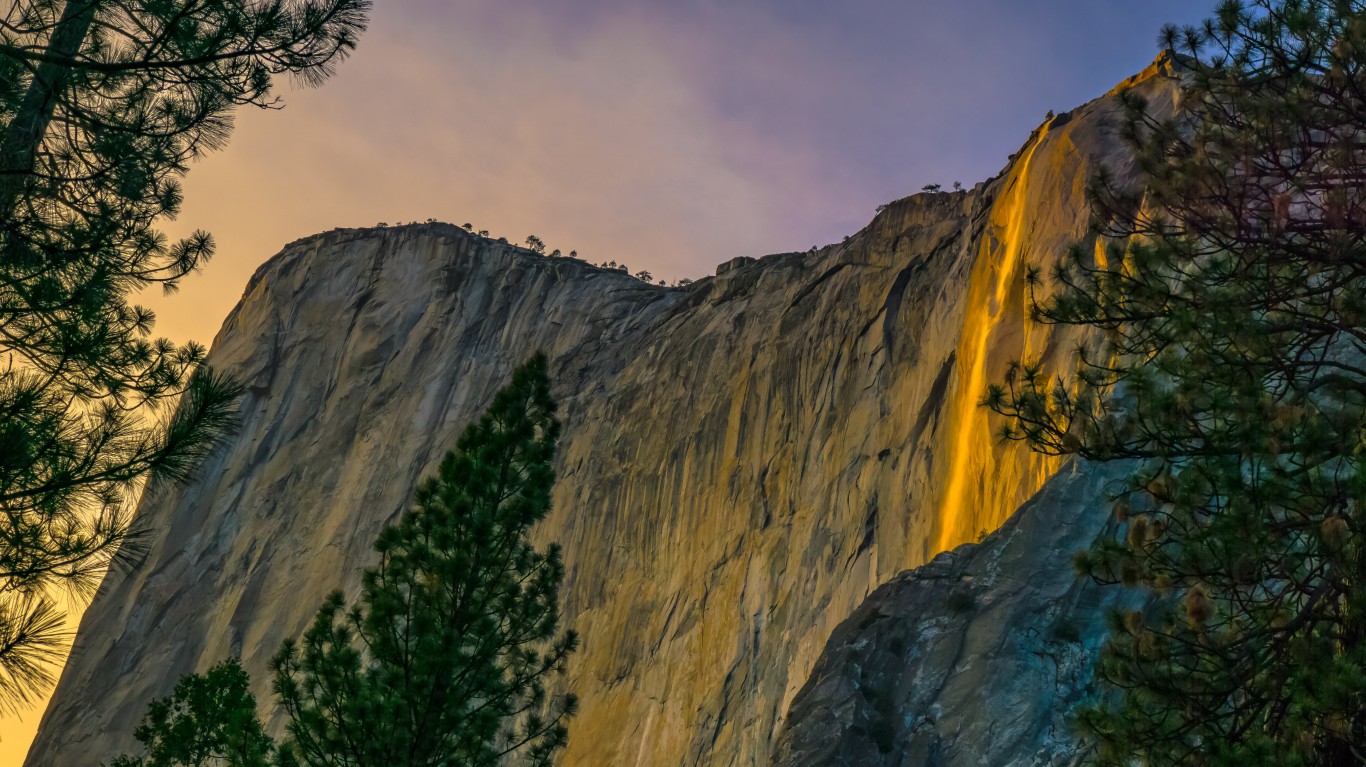
- Visitors, 2023: 3,897,070
Yosemite National Park covers 759,620 acres and spans from the Sierra National Forest on the southeast and Stanislaus National Forest on the northwest. Yosemite is known for its granite cliffs, waterfalls, clear streams, groves of giant sequoia, lakes, mountains, meadows, glaciers, and biological diversity. Most of the visitors spend the majority of their time in the valley’s 7 square miles.
The park is home to hundreds of wildlife species, including black bears, mountain lion, and red fox, and over a thousand plant species. Activities include hiking, camping, climbing, biking, driving, and more. See more info here: https://www.nps.gov/yose/
10. Zion National Park, Utah
- Private vehicle pass: $35
A park entrance pass for a private vehicle costs $35. A motorcycle pass costs $30, and a person pass costs $20. The park notes that some vehicles and some activities could require a permit with additional costs. An annual pass costs $70. See more info here: https://www.nps.gov/zion/planyourvisit/fees.htm
10. Zion National Park, Utah
- Visitors, 2023: 4,623,238
Zion National Park is located in southwestern Utah and spans 232 square miles along the Colorado Plateau, Great Basin, and Mojave Desert regions. The park has a unique geography with high plateaus, a labyrinth of narrow, deep, sandstone canyons, buttes, mesas, monoliths, rivers, slot canyons, and natural arches. A prominent feature of the park is the 15-mile long Zion Canyon with its reddish Navajo sandstone walls that reach depths of up to 2,640 ft deep. In fact, the park’s goal is to preserve the dramatic geology.
Zion’s springs and waterfalls support lush and colorful hanging gardens and a variety of life zones that make for unusual plant and animal diversity, including bobcat, desert bighorn sheep, mountain lion, and more. Activities include canyoneering, biking, camping, climbing, hiking, birding, and more. See more info here: https://www.nps.gov/zion/
Thank you for reading! Have some feedback for us?
Contact the 24/7 Wall St. editorial team.
